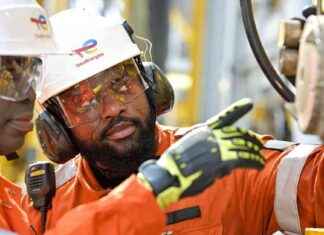Fourteen candidates, three of whom are running in the lead, are running in the Cypriot presidential election in the southern part of the island, the first round of which is being held on Sunday February 5. The 561,000 voters will have the task of choosing the successor right-wing president Nicos Anastasiades. The campaign has, however, been disrupted by corruption scandals, as well as runaway inflation, much more than by the reunification of the Mediterranean island divided for almost half a century.
According to exit polls published by several Greek Cypriot media, diplomat Nikos Christodoulides would come out on top but without an absolute majority, and a second round should be held on February 12. Turnout reached around 72%, slightly higher than in the last presidential election in 2018, according to the first official figures released after the close of office at 6 p.m.
A member of the European Union since 2004, Cyprus has been divided since Turkey invaded the northern third of the island in 1974 in response to a coup by Greek Cypriot nationalists who wanted to reunite the country with Greece. The Greek Cypriot government only exercises authority over the southern part of the island, separated by a UN-controlled demilitarized zone, called the Green Line, from the self-proclaimed and recognized Turkish Republic of Northern Cyprus (TRNC). only by Turkey, where the Turkish Cypriots live.
Nikos Christodoulides, who presents himself as “independent”, is given the favourite. This 49-year-old diplomat, supported by the centrist parties, was President Anastasiades’ foreign minister between 2018 and 2022. His main opponents are Andreas Mavroyiannis, a 66-year-old diplomat supported by Akel (Communist Party), former chief negotiator Greek Cypriots in the reunification talks (2013-2022), as well as Averof Neofytou, 61, leader of the ruling conservative party, Disy.
Hubert Faustmann, professor of politics and history at the University of Nicosia, speaks of a “strange” poll, where “the three favorites are linked to the current president”, who, at 76, completes two terms of five years.
First challenge for the new leader: inflation, which reached 10.9% in 2022. Despite a slowdown in January, to 7.1%, the rise in prices, particularly of energy and food, remains head of concern and the country experienced a general strike at the end of January. The fight against corruption also dominated the electoral debate, especially after the “golden passports” scandal. This program of granting passports against investments on the island had to be canceled due to allegations of corruption, tarnishing the image of the government of Mr. Anastasiades.
Nikos Christodoulides, however, does not seem to have been splashed. “The explanation he gave seemed plausible to the people, he said he had no direct responsibility,” said Andreas Theophanous of the Cyprus Center for European and International Affairs. “Corruption is at the heart of the debate, like the economy and daily life. The Cyprus problem (the division, Editor’s note) is a secondary subject,” said Giorgos Kentas, associate professor of international relations at the University of Nicosia.
Another sensitive subject on this island in the eastern Mediterranean, close to the coasts of the Middle East and Turkey: the influx of migrants, for which the candidates have promised to act. Authorities say 6% of the 915,000 people living in the south of the island are asylum seekers.
According to EU figures, Cyprus has the second highest rate of first-time asylum seekers relative to its population in the European Union, behind Austria. The government accuses Turkey of orchestrating a large part of the arrival of refugees from Syria and migrants from sub-Saharan Africa via the Green Line.
The future head of state will rightly be called upon to relaunch peace talks, stalled since 2017, to end the division of the island. On this file, Mr. Christodoulides is considered a “hawk” and wants the EU to isolate Turkey. Mr. Neofytou is seen as a pragmatist, while Mr. Mavroyiannis has softened his stance to agree with the Akel party line. The UN-sponsored diplomatic process stumbles on many points, such as the presence of 40,000 Turkish troops in the TRNC.
Of the more than 561,000 voters, 730 are Turkish Cypriots registered in the southern part of the island, returning officer Constantinou said on Friday. He added that 10,346 Cypriots abroad are also registered to vote.






